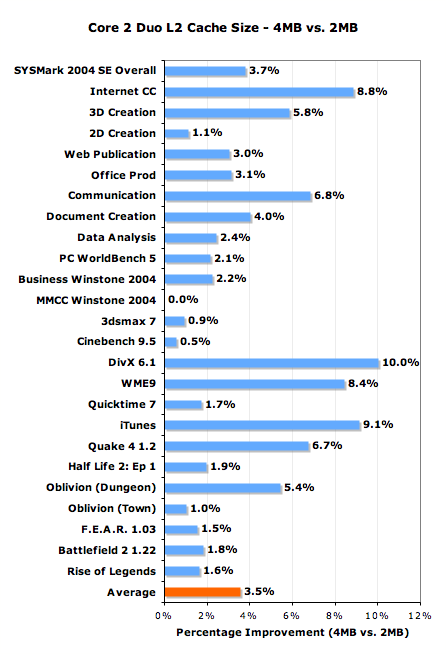Intel's Core 2 Extreme & Core 2 Duo: The Empire Strikes Back
by Anand Lal Shimpi on July 14, 2006 12:00 AM EST- Posted in
- CPUs
L2 Cache: 4MB or 2MB?
The majority of Intel's Core 2 Duo line feature a single shared 4MB L2 cache, but the E6300 and E6400 are only equipped with a 2MB cache. Given that the Core 2 Duo doesn't have an on-die memory controller, it is more dependent on larger caches than AMD's Athlon 64 X2, which raises the question - how big of a difference is there between the 2MB L2 and 4MB L2 parts?
Our Core 2 Extreme X6800 (2.93GHz) part, like all X6800s, is unlocked so we could simulate any other Core 2 Duo clock speed with it. We managed to get our hands on a Core 2 Duo E6300 (1.86GHz/2MB) and we were in business.
The graph below features all of the benchmarks we ran on the processors in this review, showing the percent performance improvement from a Core 2 Duo E6300 (1.86GHz/2MB) to a hypothetical 1.86GHz Core 2 Duo with a 4MB L2 cache. The bar labeled "Average" is simply an average of all of the performance improvements graphed on the chart.

The 4MB L2 cache can increase performance by as much as 10% in some situations. Such a performance improvement is definitely tangible, and as applications grow larger in their working data sets then the advantage of a larger cache will only become more visible. Unfortunately, you do pay a price premium for this added performance and future proofing as the cheapest 4MB L2 part is the E6600 priced at $316.
If you're the type to upgrade often, then the extra cache is not worth it as you're not getting enough of a present day increase in performance to justify the added cost. However, if this processor will be the basis for your system for the next several years, we'd strongly recommend picking a 4MB flavor of Core 2.










202 Comments
View All Comments
bob661 - Friday, July 14, 2006 - link
I agree. 20% is huge and noticeable.Chadder007 - Friday, July 14, 2006 - link
AMD's midrange holds up pretty well but when you go higher the Core2 crushes AMD this time.I would really like to see some X64bit benchmarks though to see how they will both fair with the future OSs.
Gary Key - Friday, July 14, 2006 - link
Coming shortly along with MCE2005......bob661 - Friday, July 14, 2006 - link
Don't confuse the Core Solo with the Core 2 Duo. The Solo is still Netburst whereas the Core 2 Duo is a new architecture.DrMrLordX - Friday, July 14, 2006 - link
Um what? Core Solo isn't Netburst. It's a single-core version of Yonah as I recall. Basically, it's similar to a Dothan.bob661 - Friday, July 14, 2006 - link
Which is still Netburst.mlittl3 - Friday, July 14, 2006 - link
Uh, no. Banias, Dothan, Yonah are not at all based on netburst. They are all P6 derivatives that use the netburst quad-pumped FSB. The Core Solo is a Yonah single core that has more in common with the PIII than the P4. The Core 2 Solo coming next year will be based on Conroe which of course is not Netburst. The ONLY, I repeat, ONLY netburst CPUs (not including Xeons) are the Pentium 4, Pentium D, Celeron D. There were mobile Pentium 4's on the netburst architecture but these haven't been used in years.The Pentium M (Banias and Dothan) is NOT based on netburst but a redesigned architecture based on the research in Israel.
mlittl3 - Friday, July 14, 2006 - link
And in case you try to stupidly refute me, list the number of pipelines that are in Banias, Dothan and Yonah. If the answer is less than 20, then it is NOT netburst.Oh wait, here is the answer right here.
http://en.wikipedia.org/wiki/Intel_P6">http://en.wikipedia.org/wiki/Intel_P6
A direct quote:
"It[Banias] has very limited system bandwidth, as compared to NetBurst and AMD64..."
Since Banias is not netburst and Dothan is based off of Banias and Yonah is based on Dothan, then...wait for it...all three are not netburst. Have a nice day! :)
bob661 - Friday, July 14, 2006 - link
I don't refute facts. :)mlittl3 - Friday, July 14, 2006 - link
Man after my own heart. :)